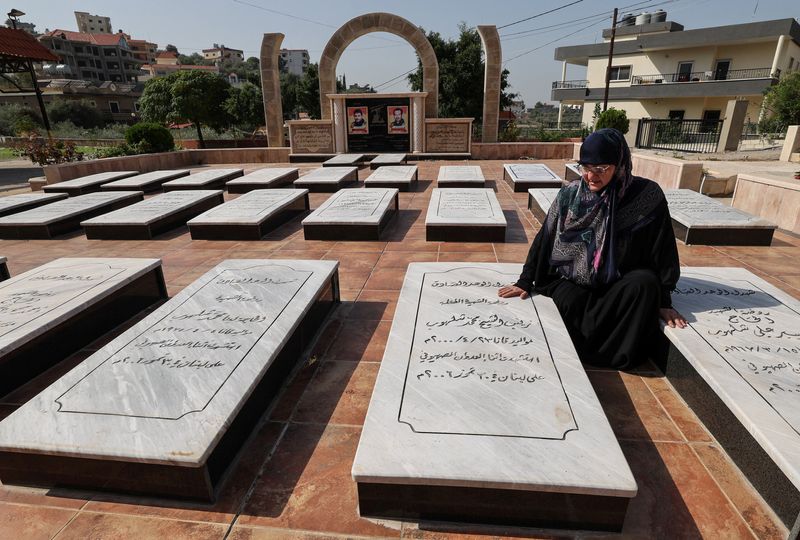By Riham Alkousaa
QANA, Lebanon (Reuters) - In the south Lebanon town of Qana, where Israeli shelling killed more than 100 people in 1996 and some 28 died in an Israeli airstrike in 2006, escalating border clashes fill residents with fear of a new war and resignation they can't escape if it comes.
People from the town, also known as Cana, which claims to be where Jesus performed his first miracle of turning water into wine, have grown used to be being caught in the crossfire of conflicts between Israel and the heavily armed group Hezbollah.
"The war is being waged at the border. Maybe its not our turn yet but you don’t know what will happen in a few days. You just wait," said Rabab Yousef, a 57-year-old mother who lost a daughter under the rubble of an Israeli airstrike in 2006.
"Every once in a while they create a war and one loses a family member. You give birth to a child and you don’t know whether this child will stay with you," she said.
When conflict erupted over Gaza after Palestinian group Hamas - an ally of Hezbollah - launched its devastating raid on Israeli soil on Oct. 7, violence quickly flared on Israel's flashpoint northern border with Lebanon.
Since then, Hezbollah, a Shi'ite Muslim group that is the most powerful of Iran's regional allies in Tehran's "Axis of Resistance", has been involved in increasingly heavy exchanges of fire with Israel's military. More than 40 Hezbollah fighters have been killed in the borderlands so far, while Israel's military says at least seven soldiers have been killed.
In Qana, which lies in the hills 11 km (seven miles) north of the border, the streets are lined with posters of Hezbollah leader Sayyed Hassan Nasrallah and Shi'ite Muslim politician Nabih Berri. South Lebanon, where many of Lebanon's Shi'ite Muslims live, is Hezbollah's heartland.
'BREAKS YOUR HEART'
As strike and counterstrikes along the frontier now send plumes of smoke into the air, Ghazi Hussein Ai Deebh, a 55-year-old blacksmith, says he has seen it all before. "It has become a normal matter as we have been through many wars," he said.
In 2006, he carried the body of a child killed in the Israeli strike, which killed 28 people, half of them children.
An Israeli inquiry after the 2006 incident said it had been a mistake.
Qana experienced an even more devastating incident a decade earlier. In 1996, Israeli shelling hit a U.N. peacekeeper base where hundreds of civilians had been sheltering, killing 106 people, most of them women and children.
Israel voiced regret at the 1996 incident, which prompted it to wind down its Lebanon operation at the time.
The incident occurred during Israel's "Operation Grapes of Wrath" campaign launched in retaliation for Hezbollah shelling during a period when Israel occupied a swathe of south Lebanon.
"It's in front of me as it happened today. Especially the children, nothing breaks your heart like children (being killed)," said Jamil Salameh, 56, a survivor of the attack and now a security guard at a monument to the 1996 incident.
In her shop, 54-year-old shop owner Kefah said: "Inshallah (God willing) these days won’t come back."
Declining to give her full name, she added that the town was ready for any eventuality. "It's up to the big leaders. If there is war, we are up for it. We don’t have fear," she said, speaking next to a poster of Nasrallah.

Sabah Krecht, 57, was less sanguine, saying a deep economic crisis in Lebanon meant many people could not afford to leave.
"We're afraid," she said. "But where can we go to? This time, it feels like they are giving us time so we can flee but it's financially difficult to go somewhere else."
